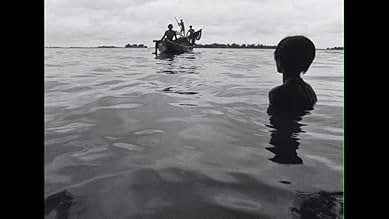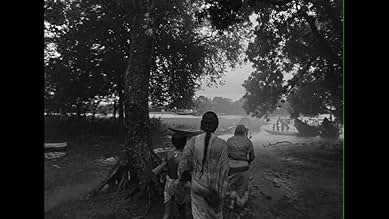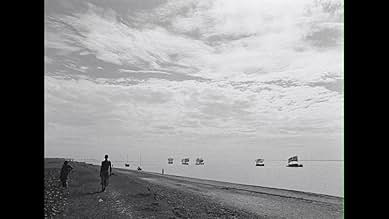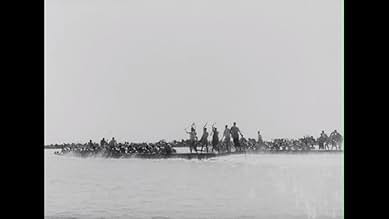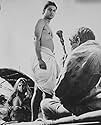IMDb RATING
7.2/10
1.4K
YOUR RATING
After their wedding night, a fisherman's young wife is kidnapped on the Titas River in Brahmanbaria, Bangladesh.After their wedding night, a fisherman's young wife is kidnapped on the Titas River in Brahmanbaria, Bangladesh.After their wedding night, a fisherman's young wife is kidnapped on the Titas River in Brahmanbaria, Bangladesh.
- Director
- Writers
- Stars
- Director
- Writers
- All cast & crew
- Production, box office & more at IMDbPro
Featured reviews
The storytelling here is segmented and leans heavily on symbolism, but the acting is distractingly poor. It is difficult to stomach the dialogue, but that may be a translation/captioning issue.
This film by somewhat neglected Indian director Ritwik Ghatak is one of the most unusual I have ever seen. The stories are set among the harsh life around the banks of Bangladesh's rivers (one of the poorest regions of the world). It tells several gruesome tales: abductions, escapes, living among strangers, death, though the characters go through this with the resignation of someone who knows that life is hard and always have been. Now, having seen this film more than a decade ago, I cannot recall all the details. But the unusual part is the way this story is told. It puts a character at the center of the story for, say, twenty minutes, and then it moves to another character, who was playing a minor role in the first story. And then to another character, and so on. It is a collection of stories, but loosely (or not so loosely interconnected). Overall, a fine tapestry of life in one of the poorest parts of the world.
10smkbsws
When anybody (even I used to say the same) tells you more money leads to lesser art, this epic saga can be a staple example to prove them wrong. This is based on a semi autobiographical novella by Adwaita Mallabarman, depicting the life and times of a fishing society by the bank of a River, called Titas, over a period of time. I can say that this has more distinguishable cast than "Sholay". Or till some extend, this has the range, both chronological and geographical, this even tops "Gangs Of Wasseypur" or "The Godfather" series. There are many features and documentaries on this film and I remember someone telling this was Ghatak's El Dorado (Note that the kid in "Bari Theke Paliye" started his journey by inspired of the stories of El Dorado). One of the major positive change was in editing, and the uber famous Bashir Hossain did show his fresh take on cutting and transitions to both Bangladeshi and West Bengal audience. His technique was so liked that Ghatak hired him again for his own semi autobiographical "Jukti Takko Aar Gappo". Another thing is heavily layered and beautifully set up blocking, which we have been seeing from "Ajantrik" till his latest series, and kudos to Baby Islam's camerawork to take it to the next level. One of my friend told that Ghatak loved the relationship between a boat and camera, which was incepted in "Bari Theke Paliye", shown accordingly in the trilogy and blooms to its full potential in this film. Also, have to mention the plot explicitly as it shows the microcosm of a society of people who belong to the lower caste of a minority section and all the hierarchy was used for plots.
"I miss my daughter. She left yesterday. My last dear one. She was all I had. My only daughter. That's the way it happens. It all comes and then disappears again. There's a spark of life. And suddenly it's not there. It all becomes untraceable. You were a child yesterday. Today you're a woman. This ever-flowing river Titas may become bone dry tomorrow. It may not even have the last drop without which our soul cannot depart. Yet these flocks of sails move on and on and on..."
Taken at face value, this film comes across as a long melodrama, and a pretty damn contrived one at that. A couple of young men go out fishing with their uncle, and in a chance encounter with a young woman in another village, one of them gets married. It's pretty odd, as they don't know each other's names, barely speak, and yet consummate what amounts to an agreement for an actual ceremony back in his village. On their way back home, however, they're set upon by bandits and she ends up overboard.
It's interesting (and a little depressing) to see how women are treated early on here - when they discover the woman gone, the reaction of the men is to shot they've been robbed, as if she's a material possession. Meanwhile, back at home the groom had a young girl waiting for him - and I do mean young; she's told by her uncle that she's a "woman now" but looks about 10. However, there is a strong woman character who emerges later in the film, one who stands up for herself and amidst great hardship says that there is only one true thing in life, and that's motherhood.
Back to the story. The man goes crazy literally that night for fear his wife has drowned - even though he was just telling his buddy he didn't even know what she looked like, and certainly hasn't formed deep feelings for her. And it turns out the woman survives and is picked up by benevolent strangers, but the next we see of her we've fast forwarded ten years. The only thing she knew about her husband was the name of his village, and she has a child, having conceived on her "wedding night." She makes her way to this village (why only now, we don't know), and throws herself on the mercy of the villagers. The woman who takes her in is the one who had loved her husband. She got married to his buddy instead, but the buddy died, so she's a young, childless widow herself.
Now how the villagers aren't able to connect the dots and realize that this new arrival and the "crazy man" living among them were the ones who had married years ago is a mystery, and it's also odd that the woman doesn't recognize the man, even though he's all disheveled and years have passed. She's attracted to him nonetheless but tragedy strikes in a way I won't describe, leaving their son an orphan. He's cared for by the same family that took them in, but the woman's mother looks at him as her mortal enemy since he's not kin and consumes food. He has visions of his dead mother as a goddess, but his real life is very sad. The plot follows the boy and his adoptive mother (or "auntie") from there and continues its quick pace for dramatic turns of events in the second half (yes all of what I described happens in the just the first half).
While the plot is sprawling and a bit of a mess, the film is undoubtedly a parable for something higher. At its heart it seemed to be about loss, forms of which happen to many characters through fate, or man's cruelty to man. Just as the rain pours down on this river (it's a very wet film!), life pours down on people, if I can use such a cliché analogy. In our better natures, we help others and are compassionate, and in our worse natures, we're selfish and unkind. The film is about life and carrying on despite the struggle, even though ultimately everything we cherish will eventually pass away - even big things that seem so permanent, like rivers. That's alluded to in the first ten minutes with the quote at the top of this review, and there's something deep at the film's center that I appreciated. I only wish it worked as well on a literal level.
The caliber of filmmaking is high, with beautiful black and white cinematography that transported me to this time and place. Attention is paid to sound, such as the heavy breathing of anxiety from the young woman before being taken to bed by her husband on their wedding night. The performance from Rosy Afsari stands out in a pretty solid cast. All of the ingredients are there, and with the deeper meaning it was a near miss for a higher rating.
Taken at face value, this film comes across as a long melodrama, and a pretty damn contrived one at that. A couple of young men go out fishing with their uncle, and in a chance encounter with a young woman in another village, one of them gets married. It's pretty odd, as they don't know each other's names, barely speak, and yet consummate what amounts to an agreement for an actual ceremony back in his village. On their way back home, however, they're set upon by bandits and she ends up overboard.
It's interesting (and a little depressing) to see how women are treated early on here - when they discover the woman gone, the reaction of the men is to shot they've been robbed, as if she's a material possession. Meanwhile, back at home the groom had a young girl waiting for him - and I do mean young; she's told by her uncle that she's a "woman now" but looks about 10. However, there is a strong woman character who emerges later in the film, one who stands up for herself and amidst great hardship says that there is only one true thing in life, and that's motherhood.
Back to the story. The man goes crazy literally that night for fear his wife has drowned - even though he was just telling his buddy he didn't even know what she looked like, and certainly hasn't formed deep feelings for her. And it turns out the woman survives and is picked up by benevolent strangers, but the next we see of her we've fast forwarded ten years. The only thing she knew about her husband was the name of his village, and she has a child, having conceived on her "wedding night." She makes her way to this village (why only now, we don't know), and throws herself on the mercy of the villagers. The woman who takes her in is the one who had loved her husband. She got married to his buddy instead, but the buddy died, so she's a young, childless widow herself.
Now how the villagers aren't able to connect the dots and realize that this new arrival and the "crazy man" living among them were the ones who had married years ago is a mystery, and it's also odd that the woman doesn't recognize the man, even though he's all disheveled and years have passed. She's attracted to him nonetheless but tragedy strikes in a way I won't describe, leaving their son an orphan. He's cared for by the same family that took them in, but the woman's mother looks at him as her mortal enemy since he's not kin and consumes food. He has visions of his dead mother as a goddess, but his real life is very sad. The plot follows the boy and his adoptive mother (or "auntie") from there and continues its quick pace for dramatic turns of events in the second half (yes all of what I described happens in the just the first half).
While the plot is sprawling and a bit of a mess, the film is undoubtedly a parable for something higher. At its heart it seemed to be about loss, forms of which happen to many characters through fate, or man's cruelty to man. Just as the rain pours down on this river (it's a very wet film!), life pours down on people, if I can use such a cliché analogy. In our better natures, we help others and are compassionate, and in our worse natures, we're selfish and unkind. The film is about life and carrying on despite the struggle, even though ultimately everything we cherish will eventually pass away - even big things that seem so permanent, like rivers. That's alluded to in the first ten minutes with the quote at the top of this review, and there's something deep at the film's center that I appreciated. I only wish it worked as well on a literal level.
The caliber of filmmaking is high, with beautiful black and white cinematography that transported me to this time and place. Attention is paid to sound, such as the heavy breathing of anxiety from the young woman before being taken to bed by her husband on their wedding night. The performance from Rosy Afsari stands out in a pretty solid cast. All of the ingredients are there, and with the deeper meaning it was a near miss for a higher rating.
I am just trying to justify my rating of the film (9 out of 10) which demands a perusal of its technical excellence.
This film is an adaptation of Adwita Malla Burman's Bengali literary classic under the same title. It is tale of those marginal people belonging to a poorer fishing community who live from hand to mouth. Exploring different sectors of life is one of the most amazing aspects of both the film and the novel.
The film sequences are maintained in parallel to the novel. The film has brilliant editing and that makes it very dynamic and fluent. Fade-ins and fade-outs for transition are used in many cases. The film seems to be gradually acquiring technical sophistry. Fixed frame is used in many cases and the camera movement is kept at a minimal level at the beginning of the film. Panning, tilt-ups and tilt-downs are countable. But this 'apparently' mediocre camera usage could not amputate Ghatak's craftsmanship. Some continuity cuts during the long duration shot of 'Dourer Naw' (Boat for Running Races) certainly deserve positive appraisal. The film has some stunning close ups. They really deserve applause. The close ups are symbolic and very well-articulated.
Negative aspects are minimum but they cannot be overlooked as they have an effect on the film. Sometimes the characters deliver speeches in a word or two in urban Bengali which betray the realism their acting. The film has got only two framing errors. It is the disadvantage of using fixed frame. Moreover the spectators are captured who came to watch the shooting for once (while Basanti was engaged in a fight with her mother) in the film. In another case, probably the prompter is captured or the person may be another spectator while Kader Mian was arguing with his daughter-in-law. The sequences sometimes seem to be incredulously positioned. Moreover, they seem to be hastily pushed towards their respective ends. But Ritwik's crave for stark realism is praiseworthy. Other than these, this film is technically perfect.
The film is a must watch for having a better exposure of the lives of marginal people of a third world country. Technical excellence is another reason to watch this film.
This film is an adaptation of Adwita Malla Burman's Bengali literary classic under the same title. It is tale of those marginal people belonging to a poorer fishing community who live from hand to mouth. Exploring different sectors of life is one of the most amazing aspects of both the film and the novel.
The film sequences are maintained in parallel to the novel. The film has brilliant editing and that makes it very dynamic and fluent. Fade-ins and fade-outs for transition are used in many cases. The film seems to be gradually acquiring technical sophistry. Fixed frame is used in many cases and the camera movement is kept at a minimal level at the beginning of the film. Panning, tilt-ups and tilt-downs are countable. But this 'apparently' mediocre camera usage could not amputate Ghatak's craftsmanship. Some continuity cuts during the long duration shot of 'Dourer Naw' (Boat for Running Races) certainly deserve positive appraisal. The film has some stunning close ups. They really deserve applause. The close ups are symbolic and very well-articulated.
Negative aspects are minimum but they cannot be overlooked as they have an effect on the film. Sometimes the characters deliver speeches in a word or two in urban Bengali which betray the realism their acting. The film has got only two framing errors. It is the disadvantage of using fixed frame. Moreover the spectators are captured who came to watch the shooting for once (while Basanti was engaged in a fight with her mother) in the film. In another case, probably the prompter is captured or the person may be another spectator while Kader Mian was arguing with his daughter-in-law. The sequences sometimes seem to be incredulously positioned. Moreover, they seem to be hastily pushed towards their respective ends. But Ritwik's crave for stark realism is praiseworthy. Other than these, this film is technically perfect.
The film is a must watch for having a better exposure of the lives of marginal people of a third world country. Technical excellence is another reason to watch this film.
Did you know
- TriviaDirector Ghatak appears in the film as a boatman, and Basanti's story is the first of several melodramatic tales.
Details
- Release date
- Country of origin
- Official site
- Language
- Also known as
- A River Called Titas
- Production company
- See more company credits at IMDbPro
- Runtime2 hours 39 minutes
- Color
- Sound mix
- Aspect ratio
- 1.37 : 1
Contribute to this page
Suggest an edit or add missing content

Top Gap
What is the Mexican Spanish language plot outline for Une rivière nommée Titash (1973)?
Answer
